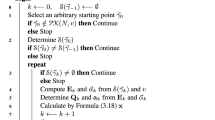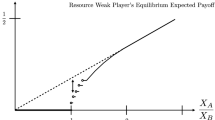Abstract.
A partially defined cooperative game is a coalition function form game in which some of the coalitional worths are not known. An application would be cost allocation of a joint project among so many players that the determination of all coalitional worths is prohibitive. This paper generalizes the concept of the Shapley value for cooperative games to the class of partially defined cooperative games. Several allocation method characterization theorems are given utilizing linearity, symmetry, formulation independence, subsidy freedom, and monotonicity properties. Whether a value exists or is unique depends crucially on the class of games under consideration.
Similar content being viewed by others
Author information
Authors and Affiliations
Additional information
Received June 1996/Revised August 2001
Rights and permissions
About this article
Cite this article
Housman, D. Linear and symmetric allocation methods for partially defined cooperative games. Game Theory 30, 377–404 (2002). https://doi.org/10.1007/s001820100086
Issue Date:
DOI: https://doi.org/10.1007/s001820100086




